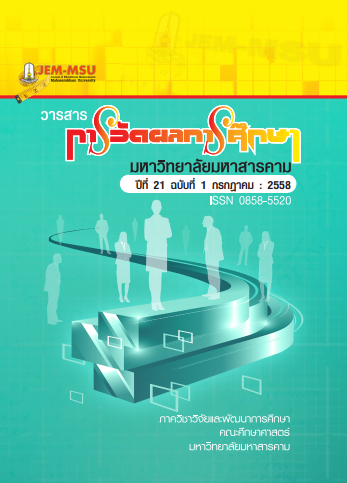The Development of Mathematics Learning Management using Inquiry Approach with The Geometer’s Sketchpad Program (GSP) to Real Situations on Conic Sections
Main Article Content
Abstract
The results of Ordinary National Education Test (O – Net) of Thai students
were found that most of them had low mathematics achievement. This is the
mathematics learning management using inquiry approach with the Geometer’s
Sketchpad Program to real situations which it was focused on discover knowledge of
their own with good innovation. It was a good teaching method to help on teaching –
learning mathematics more efficiently. The purposes of this research were : 1) to
develop the lesson plans of the mathematics learning management using inquiry
approach with the Geometer’s Sketchpad Program to real situations on conic
sections and the regular learning management, the efficiency criteria of 75/75 2) to
find the effectiveness index of the mathematics learning management of two
approach 3) to compare the learning achievement and the ability to solve on
mathematics problems about conic sections of Matthayomsuksa 4 students between
the mathematics learning management of two approach, and 4) to study the
satisfaction of students on their learning activities by the mathematics learning
management using inquiry approach with the Geometer’s Sketchpad Program to real
situations.
The sample groups used in this research were 57 students of Matthayomsuksa
4, Sarakhampittayakhom School, Mueang district, Maha sarakham province by Two –
stage sampling. There were 4 types of the instruments used in the study. They were
: 1) Twenty - four hour lesson plans of the mathematics learning management using
inquiry approach with the Geometer’s Sketchpad Program to real situations and
twenty - four hour lesson plans of regular learning management for 12 lesson plans of
each techniques; 2) the achievement test on learning were 30 four-alternative items,
the ranging of difficulty value (P) was 0.40 - 0.76, the discrimination of each item (B)
was 0.30 - 0.75 and the reliability of all the items was 0.86, 3) the ability test to solve
conic sections on mathematics, it was 5 items of subjective test which had a difficulty
index (P) ranging 0.39 - 0.47 and the discrimination (r) of ranging 0.30 - 0.75 and the
reliability of all the items was 0.61 , and 4) the satisfaction of student’s test on their
learning activities were 20 items, they were rating scales which had the discriminating
of all the items from 0.34 - 0.85, the reliability was 0.92. The research statistics used
were a percentage, a mean, a standard deviation and hypothesis test by using
Hotelling’s T 2 .
The research results were as follows :
1. The lesson plans of the mathematics learning management using
inquiry approach with the Geometer’s Sketchpad Program to real situations on conic
sections and regular learning management of Mathayomsuksa 4 students, its efficiency
were 84.74/83.58 and 81.20/79.11, respectively. It was in the setting criteria of 75/75.
2. The effectiveness index of lesson plans of the mathematics learning
management using inquiry approach with the Geometer’s Sketchpad Program to real
situations on conic sections and regular learning management were 0.74, and 0.69. The
percentage were 74.76 and 69.03 percent, respectively.
3. The students who had the lesson plans of the mathematics learning
management using inquiry approach with the Geometer’s Sketchpad Program to real
situations on conic sections got higher learning achievement and higher ability to solve
conic sections on mathematics than the students who had regular learning management.
They were statistically different, significant at 0.05 level.
4. The students who had the mathematics learning management using
inquiry approach with the Geometer’s Sketchpad Program to real situations on conic
sections were satisfied total in high level.
Article Details
The content and information contained in the published article in the Journal of Educational Measurement Mahasarakham University represent the opinions and responsibilities of the authors directly. The editorial board of the journal is not necessarily in agreement with or responsible for any of the content.
The articles, data, content, images, etc. that have been published in the Journal of Educational Measurement Mahasarakham University are copyrighted by the journal. If any individual or organization wishes to reproduce or perform any actions involving the entirety or any part of the content, they must obtain written permission from the Journal of Educational Measurement Mahasarakham University.


